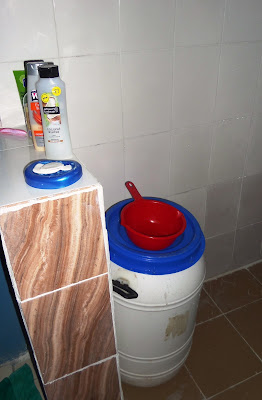Some of you may wonder how keeping house in Mattru compares to
keeping house in Atmore! In this blog we will introduce you to some of the
differences:
One of the main differences is of course the frequent absence of
electricity. This is worse in the rainy season when our solar panels struggle
to charge. But I (Heleen writing this time!) am not complaining - in Freetown I have gone for many more
hours without electricity and it makes for nice romantic candle-lit dinners and
early nights!
 |
| Headlights, Rechargeable Lights and Candles - always within reach! |
It also means we don't have a fridge or freezer which I sometimes
miss. However, our neighbours have one and every once in a while we use it to
keep some leftovers. If not, there are always hungry mouths to feed around us!
Another difference is the water supply. The hospital has its
own well and water is being pumped into the water tank several times a week.
However, money for fuel to run the generator and pump is not always available
so we have to be prepared at all times! There are buckets with water hidden
under counters and sinks and in the bathroom we have a big container. When
there is no water we take “bucket baths” while standing in a tub so afterwards
the water can be used to flush the toilet! Of course we don’t have hot water
which is fine in the hot, dry season, but in the rainy season we sometimes dread
getting our bodies cleaned! So every once in a great while we boil some water
on the stove and indulge in a nice warm “bath”.
Although the water from the well is relatively clean, we do have
to filter it before drinking. Again, compared to Freetown we are much better
off, since the water over there is so dirty that the filter gets clogged up
frequently while here we can go for months without cleaning!
When I moved to Atmore I was so excited I got to own a dish washer
for the first time in my life! But alas, it is back to doing dishes by hand,
and here we even have to boil the water to get all the grease removed from our
plates. Many dishes here are cooked with palm oil and it leaves a thick, orange
film of grease on anything it touches. We use a bar of locally made soap called
“72% soap”. We have no idea what the 72% stands for but it smells so good I
wish I could ship some to America!
We are blessed with Kadi, a girl who comes in for a few hours
three times a week to help clean and do laundry. She is very good at her job
and it frees us up to do our work as everything here seems to get dirty a
little faster and takes more effort to clean up! The main challenge in the
rainy season is to get our things dry. It can take many days, sometimes up to a
week, for clothes to be dry enough to wear again. At the height of the rainy
season (July/August) nothing will ever be 100% dry and we have had to adjust
our standards of freshness as we stick our noses in our clothes and towels to
decide if they are fit to be used J
Culturally in Sierra Leone, you can never give your underwear to
others to be washed, so we have to do that ourselves. Many years ago my
missionary sister taught me the trick of using a plunger to give our
undergarments a good scrub!
So far we have survived our stay without ironing any of our
clothes, but since ironing will also help to get our clothes to dry, Jon fixed
our charcoal iron today. I hope Kadi knows how light it because I don’t have a
clue!
I will keep our cooking adventures for another time, but from
Monday through Friday we are blessed to have this basket arrive on our doorstep
every day around 1.00 pm. It holds two cute bowls with our rice and plasas (sauce)
for the day. Thank you Yealie, for taking care of us!
Decorating and creating a “nest” has been a bit of a challenge but
I am so happy with the large selection of fabrics with beautiful African prints
on the local market. And hey, I read on a Dutch website that bright red,
yellow and blue are expected to be the new trend in home decorating so we are
setting a trend here!
Thanks to several donations we have on special occasions been able
to treat ourselves to a real cup of coffee. It takes some extra effort but the
result is worth it! However by now we have almost come to appreciate Nescafé
just as much, so we are quite content with that! We can’t wait to have some of
you join us for a cup some day!
Well, just before I completed this blog my dear husband came in
with some Zinnias from our garden! Now we don’t only have candles but even flowers
to grace our table!
We are grateful for a house that has become a home! Much
love from both of us!
Jon and Heleen











